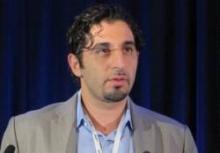NAPLES, FLA. – Posttraumatic stress disorder is disturbingly common among U.S. trauma surgeons, according to a national survey.
Among 453 members of the American Association for the Surgery of Trauma (AAST) and Eastern Association for the Surgery of Trauma (EAST), 40% had symptoms of PTSD and 15% met the diagnostic criteria for PTSD.
"It’s the elephant in the room," Dr. Bellal A. Joseph said at the annual scientific assembly of EAST.
Understanding the factors that predispose trauma surgeons to PTSD may benefit patients and the profession and may be useful to national trauma surgery associations to develop targeted interventions, said Dr. Joseph, a trauma and critical care surgeon at the University of Arizona Medical Center, Tucson.
"Active surveillance to promote wellness among trauma surgeons is warranted," he said.
Invited discussant Dr. Karen Lommel, a psychiatrist who recently converted to emergency medicine at the University of Kentucky, Lexington, described the findings as "quite remarkable."
"The issue of posttraumatic symptoms and PTSD affects all of us who work in trauma, whether we choose to acknowledge it or not," she said. "Pre-hospital workers, nurses, and mental health professionals have been extensively included in PTSD studies. Unfortunately, trauma surgeons – one of the most stoic of frontline providers – have been overlooked."
Dr. Joseph described receiving pushback when proposing the study to other trauma surgeons and was told flat-out by one respondent that its hypothesis is flawed.
A self-identified senior surgeon wrote: "I found that the assumptions of the questions did not fit the trauma program I work in nor the surgeons with whom I work. They actually take trauma call to relax. Stress is not a word in our vocabulary."
The two-part survey, sent to all members of EAST and the AAST (41% response rate), was not specifically identified as a PTSD survey, but included the validated PTSD CheckList-Civilian Version (PCL-C). A score of 35 or more on the 17-item PCL-C has previously shown a sensitivity of 85% for PTSD symptoms, while a score of 44 or more is 95% sensitive and 86% specific for a PTSD diagnosis, Dr. Joseph observed.
The survey respondents were mostly male (76%), white (80%), practiced in an urban hospital (89.6%), or Level 1 trauma center (71%). More than half (54.7%) had 11 years or more of clinical practice, 21% had military experience, and 14.3% had been deployed to war.
Three-fourths (66.4%) had an annual income of at least $300,000, but 90.5% spent no more than 4 hours per day of non–sleep relaxation and 26.5% took no more than 2 weeks vacation per year.
Only 6.2% said they suffered from depression and 3% from anxiety, but 66% reported using alcohol and 5.3% smoking.
Regarding the scope of their work, 85% had four or more 24-hour calls per month, 36% had at least three critical cases per call, and 24% had at least 10 operative trauma cases per month.
Surgeons who had more than five critical cases per call were seven times more likely to develop PTSD in multivariate analysis (odds ratio, 7; P = .001), Dr. Joseph said. No other factors were significantly associated with a PTSD diagnosis.
Independent predictors of PTSD symptoms in the multivariate analysis were male sex (OR, 2; P = .04); more than seven call duties/month (OR, 2.6; P = .001); more than 15 operative cases/month (OR, 3; P = .001); less than 4 hours of daily relaxation (OR, 7; P = .01)’ and less than 2 weeks of vacation/year (OR, 2: P = .02); he said.
Following the presentation, a surgeon from the Bronx, N.Y., said one of the sticking points for his CEO in the state’s move toward American College of Surgeons’ verification is the back-up call requirement for the trauma surgeons.
"We think of this back-up call requirement as patient-centric; when you’re busy, patients aren’t well taken care of," he said. "You’ve just flipped this argument for me, which is that there’s another human being involved: the trauma surgeon. I’m going to go back, show him your abstract, and say, ‘There is another human being at work here and maybe at that fifth critical ... that fifth Level 1 activation ... it’s time to call the back-up guy.’ "
One attendee rose to say she’d just lost a colleague to PTSD and asked who should best perform an intervention to avoid any potential harm to the surgeon’s career. Another attendee responded that what’s helped the military address PTSD in its health care workers is to try to remove the perceived stigma of PTSD.

